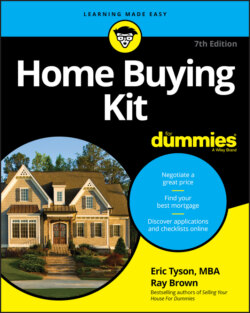Читать книгу Home Buying Kit For Dummies - Eric Tyson - Страница 15
USES FOR THE WEALTH YOU BUILD UP IN YOUR HOME
ОглавлениеOver the many years that you’re likely to own it, your home should become an important part of your financial net worth — that is, the difference between your assets (financial things of value that you own, such as bank accounts, retirement accounts, stocks, bonds, mutual funds, and so on) and your liabilities (debts). Why? Because homes generally increase in value over the decades while you’re paying down the loan used to buy the home. Remember, we’re talking about the long term here — decades, not just a few years. The housing market goes through downturns — the late 2000s being the most recent down period — but the long-term trend has always been higher.
Even if you’re one of those rare people who own a home but don’t see much appreciation (increase in the home’s value) over the decades of your adult ownership, you still benefit from the monthly forced savings that result from paying down the remaining balance due on your mortgage. Older folks can tell you that owning a home free and clear of a mortgage is a joy.
All that home equity (the difference between the market value of a home and the outstanding loan on the home) can help your personal and financial situation in a number of ways. If, like most people, you hope to someday retire but (also like most people) saving doesn’t come easily, your home’s equity can help supplement your other sources of retirement income.
How can you tap into your home’s equity? Here are three main ways:
Some people choose to trade down — that is, to move to a less costly home in retirement. Sell your home for $500,000, replace it with one that costs $300,000, and you’ve freed up $200,000. Subject to certain requirements, you can sell your home and realize up to $250,000 in tax-free profits if you’re single, or $500,000 if married. (See Chapter 17 to find out more about this homeownership tax break.)
Another way to tap your home’s equity is through borrowing. Your home’s equity may be an easily tapped and low-cost source of cash (the interest you pay is generally tax-deductible — see Chapter 3).
Some retirees also consider what’s called a reverse mortgage. Under this arrangement, the lender sends you a monthly check that you can spend however you want. Meanwhile, a debt balance (that will be paid off when the property is finally sold) is built up against the property.
What can you do with all this home equity? Help pay for your children’s college education, start your own business, remodel your home, use it toward your retirement, or whatever!
